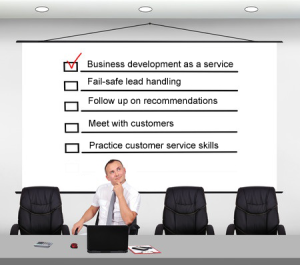 There is a difference between losing a sale and losing a customer and I experienced it first-hand this week. In this case, I became the “lost” customer.
There is a difference between losing a sale and losing a customer and I experienced it first-hand this week. In this case, I became the “lost” customer.
My car is getting a bit long in the tooth. It’s a 2008 and, with over 230,000 kilometers on the clock, it really is time to trade it in. So it was a happy coincidence that I got a call from the salesperson at the dealership where I purchased this car to tell me about a great deal on the same model I currently own. I knew that 2013 was the last model year this particular vehicle was made and I was delighted that there were still four available. I took the car for a test drive while the dealership inspected my car. When we returned, the salesperson offered me an opening price for the trade-in. The price was very low and I explained that I just could not see my way to make a deal. I thanked him for thinking of me and we shook hands.
I got a call on my cell about two minutes later from the salesperson. “Good news!” he said. It turns out that they could increase the offer by over 27%! Over the next few days we negotiated a deal that would be “acceptable to the sales manager”. We finally agreed on a number – about 43% more than the original offer for my trade-in. The sales manager accepted it. We had a deal – or so I thought.
In fact there was really no deal and that was where the problem lies. “All you need to do now is come in and sign the papers and give us a deposit and the car is yours”, the salesperson said and I arranged to come up that morning. “Everything will be ready. We won’t keep you long.” In fact, everything was not ready. There was more to it than just signing the papers. Before making good on their part of the agreement, the sales manager insisted on taking “one last look at my car”. So the deal, unbeknownst to me, was conditional on a second inspection of my vehicle.
I am sure you can guess what happened next. The sales manager inspected my car, returned to his office, and had a quick word with the salesperson, who, was sent out to tell me that they could not honour the offer that they had agreed to just 30 minutes before. I wasn’t very happy and a little upset that I was not told that our agreement was conditional. I felt that my time was wasted and I expressed my disappointment to the salesperson and that I thought they had acted very unprofessionally. It occurred to me that this is the type of activity that gives car salespeople such a bad name.
In their zeal to make the sale, they lost sight of the customer – a customer who has been with this dealership since 2008. They could (and should) have been honest with me during the negotiation. Had they been up front with me that the deal we negotiated was conditional on a second inspection, or had they made it clear that their original offer was the best that they would be able to do instead of putting me through a “mock” negotiation that they wouldn’t honour, then I would have little cause for complaint. In either case, I may not have ultimately purchased this car, but they would have kept a customer. Sadly, they have lost both.
This incident brought to focus the difference between losing a sale and losing a customer. Sometimes we get so focused on the prize, that we will rationalize any means to get there. Questionable tactics may win the sale on occasion, but the risks are high. If caught we will not only lose the sale, but also the customer. And that lost customer is bound to tell others about the experience.
Professional business people realize that it is better to be up-front with the customer even if it means that they are unable to come to an agreement. When approached this way, the business person may not win the immediate sale, but their integrity will likely win their respect and retain the customer and the opportunity to serve them in the future.
I’d love your feedback on this. And as always, please feel free to leave a link back to your own blog if you have one via the commentluv feature here on the site. If you are reading this blog post via email, you will need to locate this post on my website by clicking here. Scroll down to the bottom of the page where you will find the comment section.
Jim
“The secret of life is honesty and fair dealing. If you can fake that, you’ve got it made.”
– Groucho Marx
 If you are actively engaging your technicians in promoting your services, here are 5 questions to help you evaluate how proactive your service team is. These questions are part of our ‘How Proactive is Your Service Team’ Checklist.
If you are actively engaging your technicians in promoting your services, here are 5 questions to help you evaluate how proactive your service team is. These questions are part of our ‘How Proactive is Your Service Team’ Checklist.
 Frustrated by the poor quality of the information provided by your technicians on work orders? The importance of the quality of the work order resolution description is often overlooked. The fact is the quality of this information is very important! Below are 4 easily remembered components that your technicians can include to better communicate the value of the work they have performed. The four components are captured using the acronym CARE.
Frustrated by the poor quality of the information provided by your technicians on work orders? The importance of the quality of the work order resolution description is often overlooked. The fact is the quality of this information is very important! Below are 4 easily remembered components that your technicians can include to better communicate the value of the work they have performed. The four components are captured using the acronym CARE. How is your business really doing was the subject of my
How is your business really doing was the subject of my  Whenever I speak on the subject of Proactive Service® , invariably someone will ask me how do we really know how we are doing? I mention that there are several measures to consider. Higher sales and revenues, increased customer satisfaction and improved levels of customer retention are just a few to consider. However, if you really want to know how you are doing, here are 2 questions to ask your customers through your surveys and during face-to-face visits:
Whenever I speak on the subject of Proactive Service® , invariably someone will ask me how do we really know how we are doing? I mention that there are several measures to consider. Higher sales and revenues, increased customer satisfaction and improved levels of customer retention are just a few to consider. However, if you really want to know how you are doing, here are 2 questions to ask your customers through your surveys and during face-to-face visits: “I’ll know it when I see it” is a phrase often used to describe a thing or situation which is typically subjective in nature and cannot be clearly defined. However, when it comes to empathy perhaps a better way to describe it is “I’ll know it when I feel it”.
“I’ll know it when I see it” is a phrase often used to describe a thing or situation which is typically subjective in nature and cannot be clearly defined. However, when it comes to empathy perhaps a better way to describe it is “I’ll know it when I feel it”. There is a difference between losing a sale and losing a customer and I experienced it first-hand this week. In this case, I became the “lost” customer.
There is a difference between losing a sale and losing a customer and I experienced it first-hand this week. In this case, I became the “lost” customer. Don’t make promises you can’t keep was one of the common maxims in our household when I was growing up. Wise advice. I was reminded of the importance of this message just last week and that sometimes, it is better to turn business away rather than disappoint. Have you found that you sometimes take on work or make commitments for which you have a low likelihood of fulfilling?
Don’t make promises you can’t keep was one of the common maxims in our household when I was growing up. Wise advice. I was reminded of the importance of this message just last week and that sometimes, it is better to turn business away rather than disappoint. Have you found that you sometimes take on work or make commitments for which you have a low likelihood of fulfilling? In our programs, we dedicate a portion of our time to presenting an effective technique for taking the stress out of challenging situations. We discuss the impact of stress in emotional situations and the important role that we play as technicians to reduce it. The power of this technique was brought home to me last week.
In our programs, we dedicate a portion of our time to presenting an effective technique for taking the stress out of challenging situations. We discuss the impact of stress in emotional situations and the important role that we play as technicians to reduce it. The power of this technique was brought home to me last week. “Are your customers better off having known you?” This is a question we ask in our
“Are your customers better off having known you?” This is a question we ask in our  I was reminded this morning that it doesn’t take much for a service provider to stand out from the crowd. There is a lot of focus on enhancing the customer experience and creating strong relationships that clearly differentiate you from your competition. My experience with my mobile service provider was a perfect case in point.
I was reminded this morning that it doesn’t take much for a service provider to stand out from the crowd. There is a lot of focus on enhancing the customer experience and creating strong relationships that clearly differentiate you from your competition. My experience with my mobile service provider was a perfect case in point.

